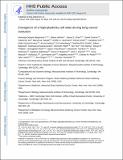Emergence of a High-Plasticity Cell State during Lung Cancer Evolution
Author(s)
Marjanovic, Nemanja Despot; Hofree, Matan; Chan, Jason E.; Canner, David; Wu, Katherine; Trakala, Marianna; Hartmann, Griffin G.; Smith, Olivia C.; Kim, Jonathan Y.; Evans, Kelly Victoria; Hudson, Anna; Ashenberg, Orr; Porter, Caroline B.M.; Bejnood, Alborz; Subramanian, Ayshwarya; Pitter, Kenneth; Yan, Yan; Delorey, Toni; Phillips, Devan R.; Shah, Nisargbhai; Chaudhary, Ojasvi; Tsankov, Alexander; Hollmann, Travis; Rekhtman, Natasha; Massion, Pierre P.; Poirier, John T.; Mazutis, Linas; Li, Ruifang; Lee, Joo-Hyeon; Amon, Angelika; Rudin, Charles M.; Jacks, Tyler; Regev, Aviv; Tammela, Tuomas; ... Show more Show less
DownloadAccepted version (3.513Mb)
Publisher with Creative Commons License
Publisher with Creative Commons License
Creative Commons Attribution
Terms of use
Metadata
Show full item recordAbstract
Tumor evolution from a single cell into a malignant, heterogeneous tissue remains poorly understood. Here, we profile single-cell transcriptomes of genetically engineered mouse lung tumors at seven stages, from pre-neoplastic hyperplasia to adenocarcinoma. The diversity of transcriptional states increases over time and is reproducible across tumors and mice. Cancer cells progressively adopt alternate lineage identities, computationally predicted to be mediated through a common transitional, high-plasticity cell state (HPCS). Accordingly, HPCS cells prospectively isolated from mouse tumors and human patient-derived xenografts display high capacity for differentiation and proliferation. The HPCS program is associated with poor survival across human cancers and demonstrates chemoresistance in mice. Our study reveals a central principle underpinning intra-tumoral heterogeneity and motivates therapeutic targeting of the HPCS. Cellular states capable of promoting tumor progression and resisting therapies exist in heterogeneous tumors. Marjanovic et al. discover that a high-plasticity cell state common to mouse and human lung tumors drives cellular heterogeneity, is highly tumorigenic and drug resistant, and associates with poor patient prognosis.
Date issued
2020-08Department
Koch Institute for Integrative Cancer Research at MIT; Massachusetts Institute of Technology. Computational and Systems Biology Program; Massachusetts Institute of Technology. Department of Biology; Howard Hughes Medical InstituteJournal
Cancer Cell
Publisher
Elsevier BV
ISSN
1535-6108